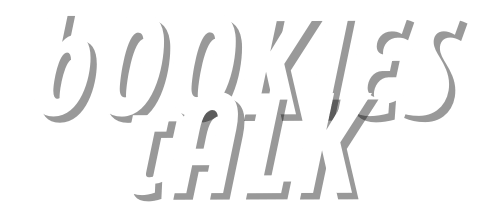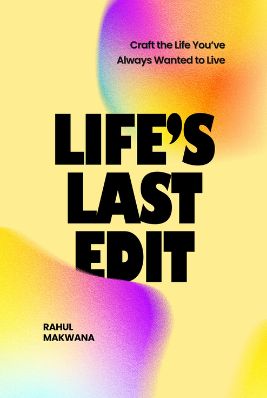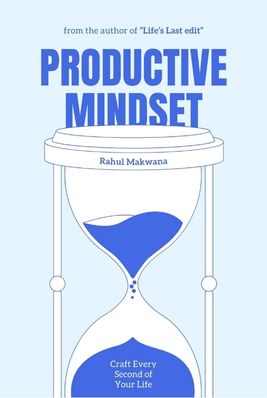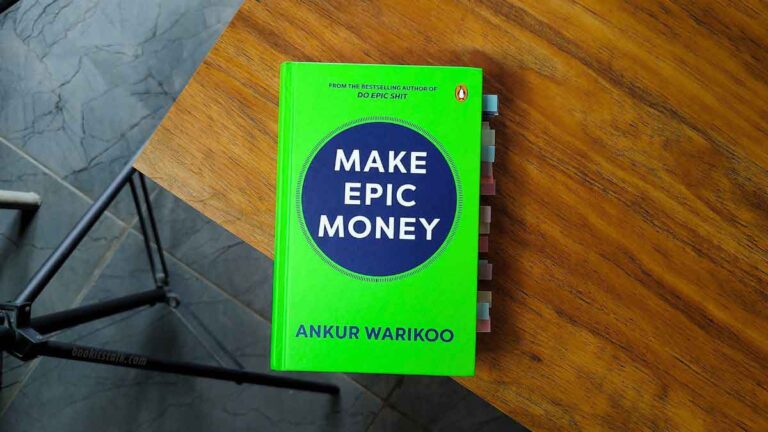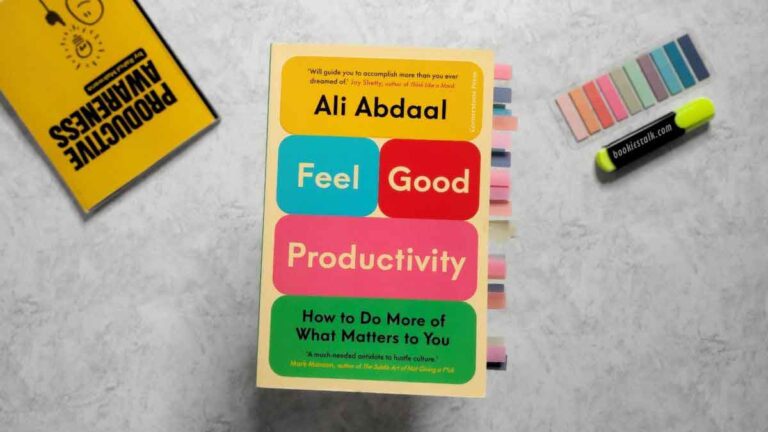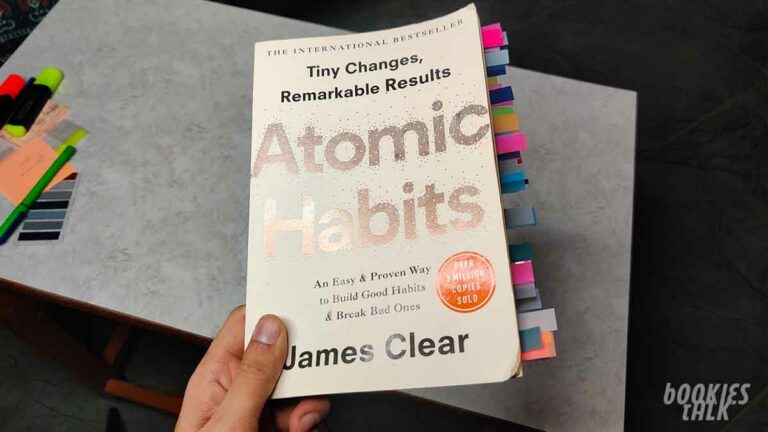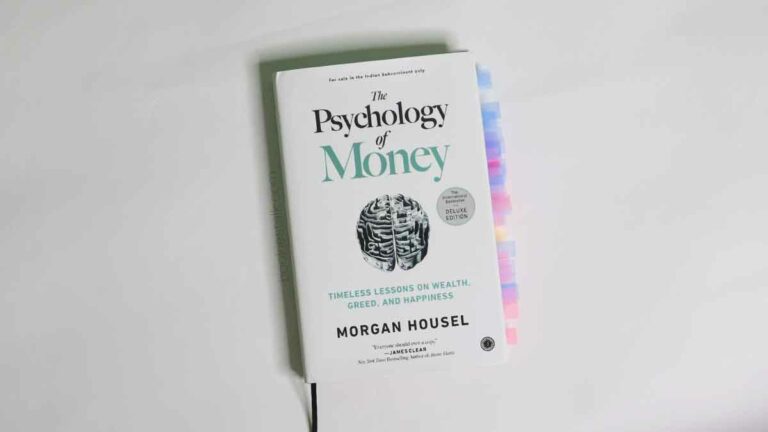Feel Good Productivity by Ali Abdaal
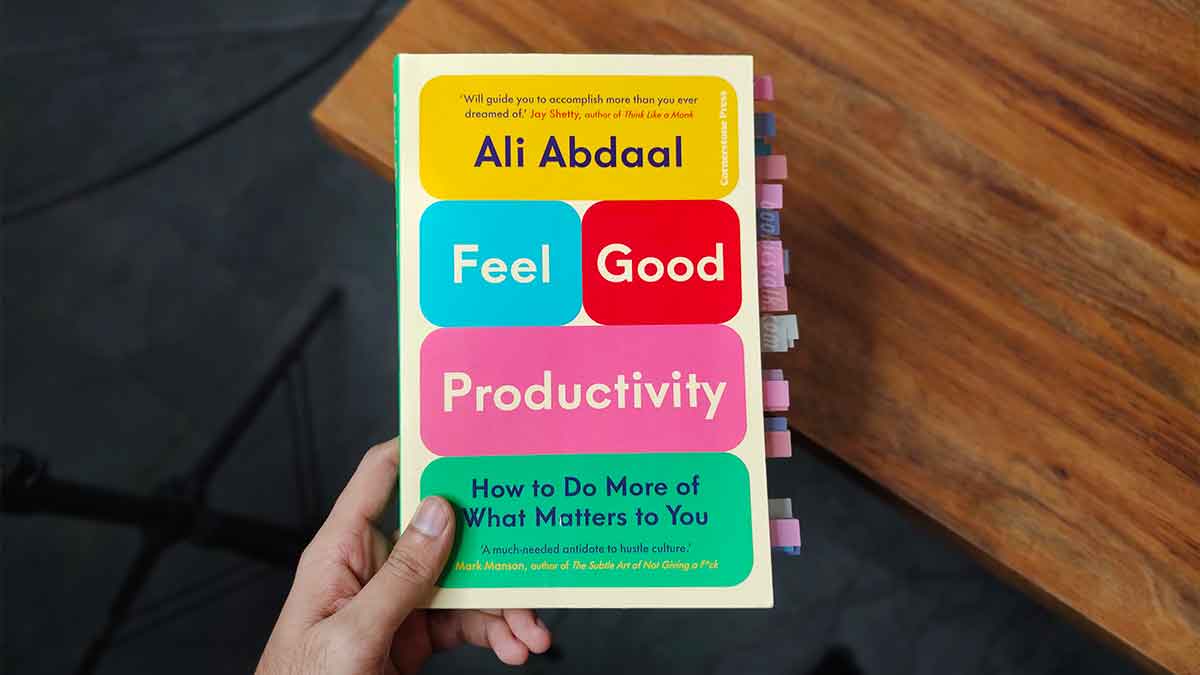
Feel Good Productivity will give you a scientific guide to living a healthy and productive life, Ali has shared more than 50 actionable tips, so you can reach your true potential.
It’s a self-help/Productivity book and has 270 pages.
Enter your email address To join the newsletter. I will be with you every Sunday at 9:00 AM (IST). See you on Sundays.
Feel Good Productivity Notes
While reading the Feel Good Productivity, I took lots of notes and that’s what I’m about to share with you. I have also organized all the notes chapter by chapter, so you can come back any time and revisit the book whenever you want.
One of the biggest takeaways I took from the book is “live in the present, learn from your mistakes and your health should be your highest priority no matter what.”
Apart from this, Ali Abdaal has shared lots of things that will help you to live a happy and healthy life.
Now, here are all the notes.
Part 1: Energise
Energise Part is all about how you can live an energized and happy life. The author has given examples,
“When we were children, we used to enjoy every single movement but that changed when we started doing jobs or businesses.”
He says, live your life in the movement rather than thinking too much about the past or future.
Chapter 1 Play
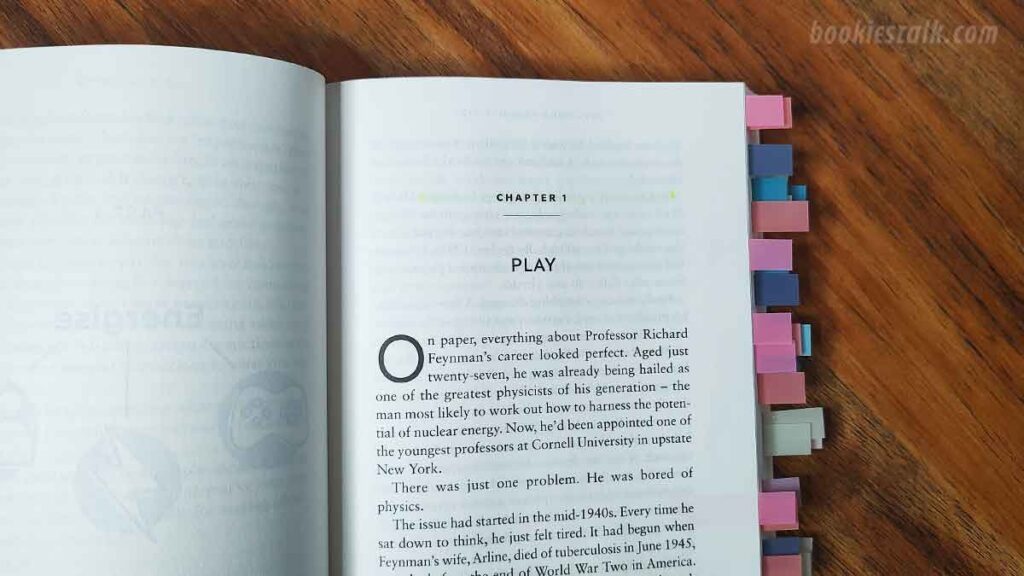
- Approaching physics not as a job, but as a game to be played for fun? ‘I got this new attitude,’ he decided. ‘Just like I read the Arabian Nights for pleasure, I’m going to play with physics, whenever I want to, without worrying about any importance whatsoever.’
- Life is stressful. Play makes it fun. Play is our first energiser. If we can integrate the spirit of play into our lives, we’ll feel better – and do more too.
- As Stuart Brown says: ‘Remembering what play is all about and making it part of our daily lives are probably the most important factors in being a fulfilled human being.’
- For one thing, the researchers had a hunch that when people were curious about something, they remembered the details better. They were right. The study showed that people were a whopping 30 percent more likely to recall a fact they found interesting, rather than a fact they found boring.
- When they were given a brain scan, their neurological activity was quite different when they were asked a question they were curious about: they seemed to receive a hit of dopamine. Dopamine is one of our feel-good hormones, and it also activates the part of the brain responsible for learning and forming memories.
- Being curious about everything not only makes you more creative. It enriches your life.’
- If your goal is to build a successful business, then your data collection process might involve testing different business ideas, products, or services. With an experimental mindset, a product launch that doesn’t meet expectations wouldn’t be a failure or a disaster; it’d just be another data point to help you refine your strategy and better understand your target market.
- No failure is ever just a failure. It’s an invitation to try something new.
Chapter 2 Play
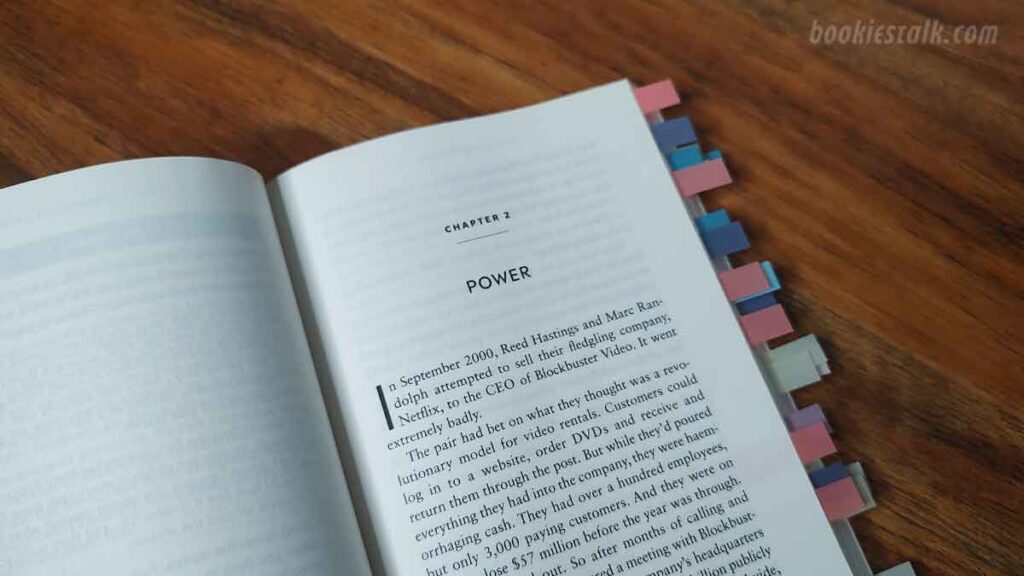
- When McCord used the word, she meant a sense of personal empowerment: the sense that your job is in your control, your life is in your hands, and that decisions about your future are yours alone
- Power is our second energiser; a crucial ingredient in feeling good and being productive. And best of all, it’s not something you seize from others – it’s something you create for yourself.
- The study was exploring a simple question. How does our level of self-confidence affect our performance? The answer to this question – along with those of many such studies before and since – is simple: a great deal. Feeling confident about our ability to complete a task makes us feel good when we’re doing it, and helps us do it better.
- Believing you can is the first step to making sure you actually can.
- 5. Next time you’re feeling like a task or project is particularly difficult, ask yourself, ‘What would it look like if I were really confident at this?’ Just by asking yourself the question, you’ll visualize yourself confidently approaching the task at hand. The switch has been flipped.
- And in my new life as a writer, I find that watching, listening to and even conducting interviews with successful authors does more to boost my own feelings of ‘I can do this’ than almost anything else. If they can, you can too.
- As the philosopher Seneca said, Qui docet discit – ‘He who teaches learns’. And once you understand the power of the protégé effect, it becomes surprisingly easy to take on the role of ‘teacher’ in almost any role.
- Viktor Frankl, the Austrian psychiatrist and survivor of the Auschwitz concentration camp during World War Two, put it beautifully: ‘Everything can be taken from a man but one thing: the last of the human freedoms – to choose one’s attitude in any given set of circumstances, to choose one’s own way.’
Chapter 3 People
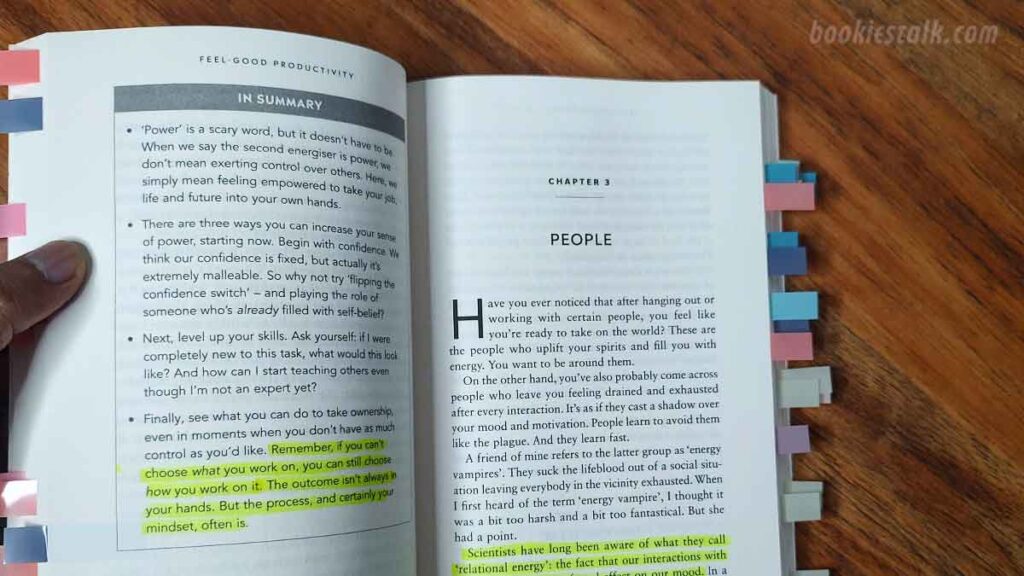
- Scientists have long been aware of what they call ‘relational energy’: the fact that our interactions with others can have a profound effect on our mood
- Teamwork is as much a psychological state as a way of dividing up tasks.
- As Walton concluded, ‘Simply feeling as if you’re part of a team of people working on a task makes people more motivated as they take on challenges.’ When the going gets tough, it’s better to have friends to lean on than enemies to lord it over.
- Synchronicity makes us want to help others. And it makes us want to help ourselves.
- Why might that be? Luks’s research showed that when we help others, our brains release a flood of chemicals that create a natural high. Feel-good hormones like oxytocin surge through our bodies, creating a wave of positive energy that can last for hours – even days – after the helping has ended.
- Finally, turn your attention away from the problem and toward the solution.
Part 2: Unblock
The Unblock part is all about procrastination, the author gives lots of tips to come out from procrastination and work on the things that need to be done right away.
Its basically, tips for procrastination filled with lots of science studies.
Chapter 4 Seek Clarity
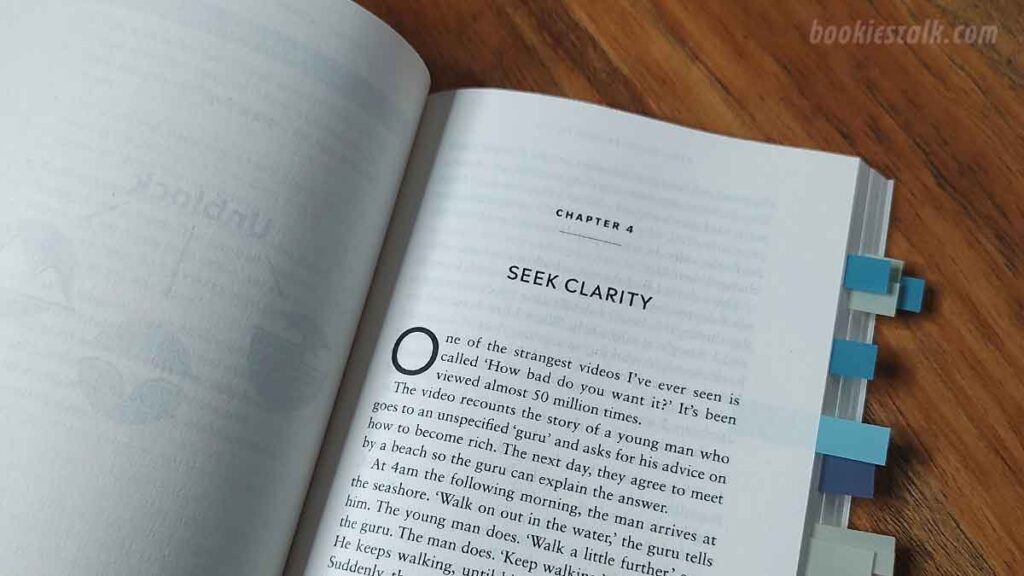
- So when motivation fails, where do we turn? When not obsessing over whether you truly are motivated, much advice turns to another principle: discipline. Put simply, discipline is when we do stuff that we don’t feel like doing. It’s the opposite of motivation; it’s taking action despite how unmotivated you are.
- The unblock method encourages us to understand why we’re feeling bad about work in the first place.
- The commander’s intent suggested that the goal of generals is to answer only the highest-level ‘why’ questions: identifying the purpose behind the operation, and, at a push, vaguely sketching out the sort of stages that might be necessary.
- You can apply this approach to almost any question. Take learning French. Ask yourself, what’s the purpose?
- You also need to remind yourself of this big ‘why’ every day and every hour. Every email you send, every meeting you hold, every chat over a coffee – in ways small and large, they should take you a little closer to realizing that ultimate purpose.
Chapter 5 Find Courage
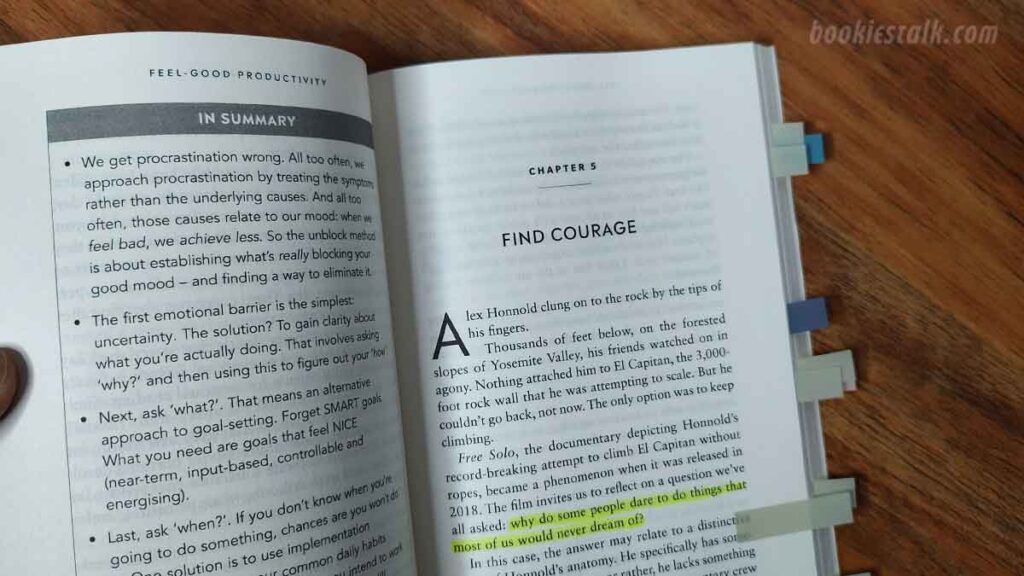
- Have you ever hesitated to apply for a job or promotion out of fear of rejection? Or put off attending a social event where you don’t know many people? Or failed to make a start on a creative project because you worry you don’t have the skills? That’s your amygdala talking, every time.
- It isn’t a lack of talent or inspiration that’s holding you back. It’s fear.
- Fear is another negative emotion that blocks our productivity. It impedes our feel-good hormones and clouds our thinking and problem-solving. Procrastination is natural in the face of fear.
- And the solution? To find courage. To look at our fear, acknowledge it, and move past it.
- Getting to know our fears is the first step towards overcoming them.
- Sometimes, our fears are about something very specific: starting a project or confronting that giant tarantula. But sometimes, our fears are broader: less about specific problems, and more about our wider identities. We hand ourselves labels that make us too terrified to get started: ‘I’m not a runner.’ ‘I’m scared of math.’ ‘I don’t like creative tasks.’
- Every potential failure has the potential to destroy our entire lives and define us forever. Take the following:
- You get rejected by someone you like. As a result, you decide that you’re not lovable and will spend your life alone.
- If we believe our ability is higher than the standard needed, then we’re confident. If we believe our ability is lower than the standard needed, then we’re doubtful
- The mindset of ‘no one cares’ can be totally transformative. It’s one of the simplest methods I’ve identified to reduce my anxiety-related procrastination.
Chapter 6 Get Started
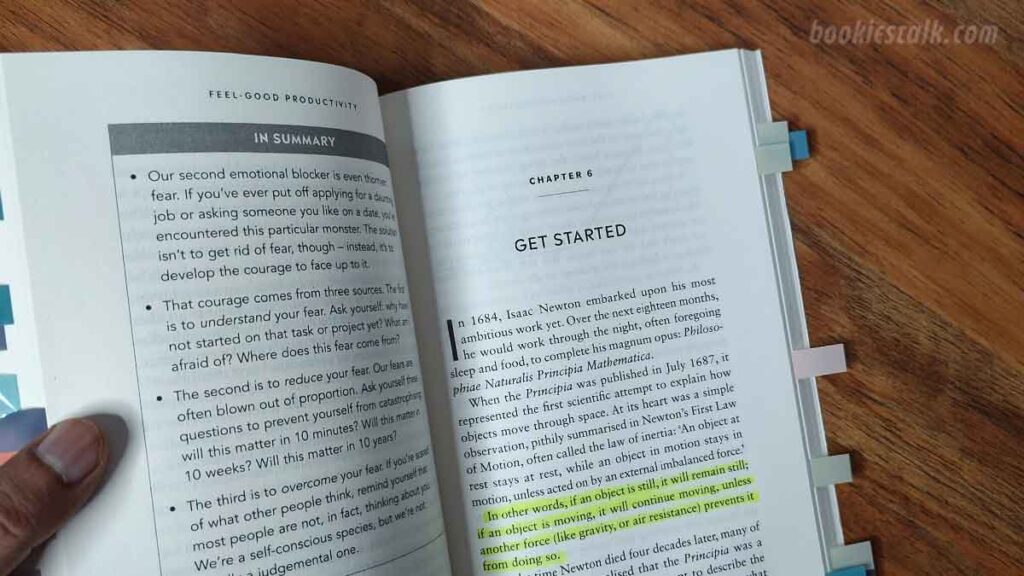
- What does this look like in practice? Well, the trick is to tweak your environment to make the thing you want to make a start on the most obvious, default decision. And, in turn, to make the things you don’t want to do the more difficult decisions. Consider some examples:
- Reducing phone usage: Turning off notifications stops picking up your phone being the default choice. Now the obvious decision is no longer checking your phone.
- Think of what this might look like in a few different situations:
- If you’re procrastinating from studying for an exam, your next action step is to get your textbook out and open it to the page you’re going to start from.
- If you’re procrastinating from going to the gym, your next action step is to change into your gym kit.
- And if you’re procrastinating from writing a book, your next action step is to turn on your laptop and open Google Docs.
- Tracking your progress provides you with tangible evidence that you’re moving towards your goals.
- Is there a way to break this doom loop? As Wohl and his colleagues found, forgiving ourselves is the escape hatch. But how? Perhaps my favorite way is a method I call Find the Win. It involves celebrating something, however small, and however unrelated to your work. I like to use the format: ‘I didn’t do X, but I did do Y.
Part 3: Sustain
The sustain part is all about how you can recharge yourself for boringness or laziness. For example, if you’ve been doing a job for years and now, if you’re having thoughts like,
- I don’t know what to do.
- I’m doing this job but I don’t feel like doing it.
- What I’m doing with my life “I’ve been working 9 to 5 for years and yet it doesn’t feel good”
- You’re running a successful business and yet you’re feeling left out.
In short, if you’re not feeling good about what you’re doing then this part will wake you up from inside.
Chapter 7 Conserve
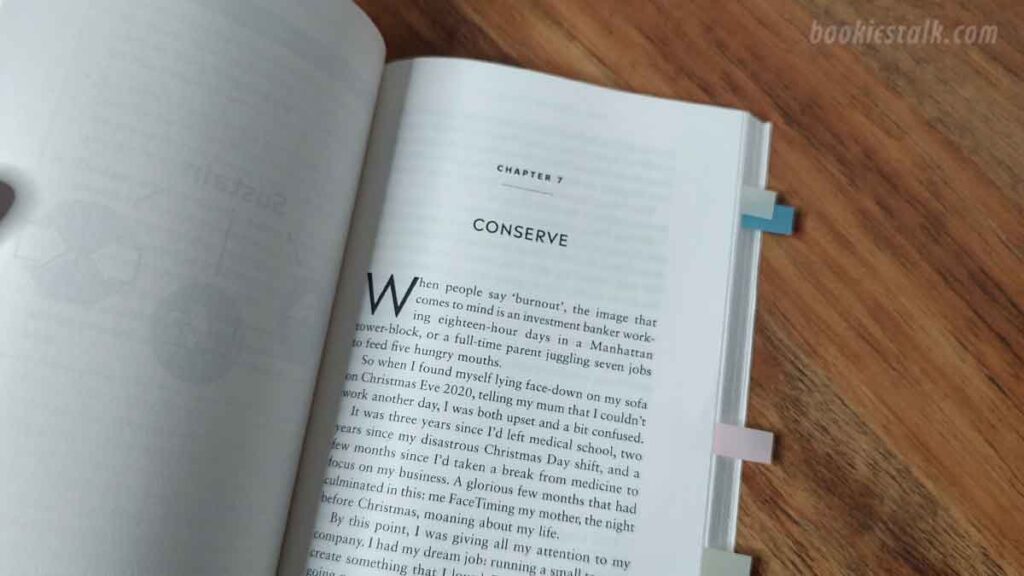
- So here I was, telling my mum about it. At first, she said exactly what I expected: ‘You should have stayed in medicine, Ali.’ (She’d used that one before.) And then she said something that I hadn’t expected at all. It sounds to me like you’re going through burnout.’
- Overexertion burnouts, I realised, come from the negative emotions that arise when we do too much, too fast. We accept more work than we can do, and fail to take the breaks in our working day that we require. We sprint all the time.
- The solution? Follow LeBron’s lead. Conserve your energy. Do less, so that you can unlock more.
- In all of these cases, we’re suffering from a simple problem – overcommitment. It is the first way we set ourselves on the path to overexertion: we say yes to things in the present, but in the long term, they’re going to grind us down.
- If it isn’t a ‘hell yeah’, it’s not worth doing.
- Life isn’t about maintaining focus all the time. It’s about allowing space for little moments of serendipity and joy.
Chapter 8 Recharge
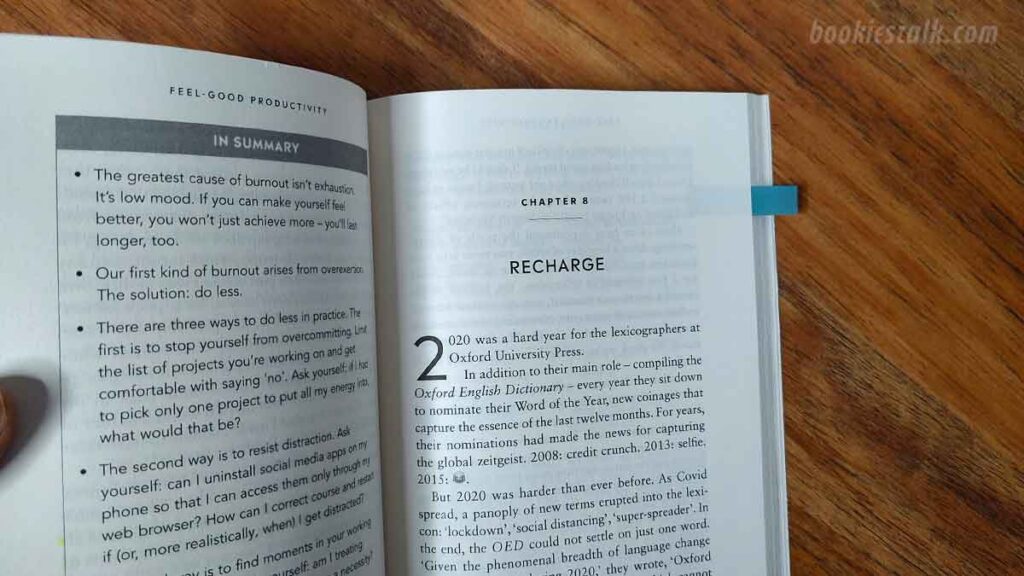
- Next, continually remind yourself that the hobby should be enjoyed for the process, rather than any kind of high-stakes goal. As you paint, play or build, remind yourself that this is an arena in which quality doesn’t matter. So allow yourself to make mistakes, experiment, and grow at your own pace. Your primary goal is not to become an expert or a master. It’s to enjoy and to recharge.
- If you want to properly recharge, you need to maintain areas of your life in which personal advancement doesn’t feature at all.
- Another way to recharge your energy creatively is by undertaking a specific project. Unlike an open-ended hobby, a project has a definite beginning and end. Projects can be particularly useful in building our sense of competence and autonomy as they give us a feeling of accomplishment when we reach our end goal.
Chapter 9 Align
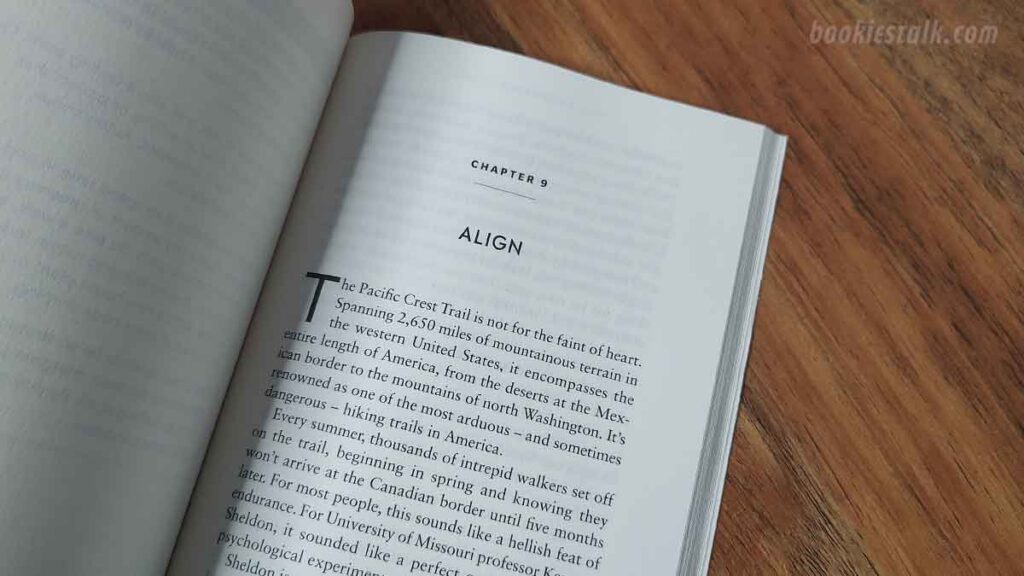
- When we think about death, we get a clearer view of life.
- Burnett’s design mindset offers an unusual way to answer the question. He invites you to reflect on:
- Your Current Path: Write out, in detail, what your life would look like five years from now if you continued down your current path.
- Your Alternative Path: Write out, in detail, what your life would look like five years from now if you took a completely different path.
- Your Radical Path: Write out, in detail, what your life would look like five years from now if you took a completely different path, where money, social obligations, and what people would think, were irrelevant.
- Thinking about the long-term horizon is great for figuring out what we value in the abstract.
- The question is how. We all make decisions every day that take us away from our values. The person who values freedom, but stays in a controlling job waiting for their shares to vest. The person who values close relationships, but spends most of their time working and neglects time with family and friends. These are instances where daily decisions don’t align with what we most desire.
- With the right tools, we can subtly shift ourselves back towards the things that matter the most.
Conclusion
Is Feel Good Productivity by Ali Abdaal one of those books that you have to read no matter what? The answer is No.
This is a good book but it is the same as other self-help and productivity books, there is nothing new that you will discover.
So if you have read a few self-help and productivity books then you can skip this book but if you’re a new reader or fan of the author then give it a read.
Buy Feel Good Productivity:
Love What You Read, You Might Like These too…
By the way, we also have a WhatsApp Channel! If you love reading, this is the perfect place for you to join—and the best part? It’s completely FREE!
